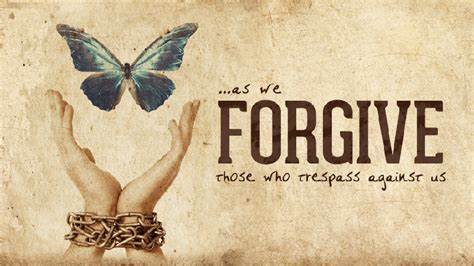How Important is Forgiveness?
Many know the Lord’s Prayer – The outline Jesus taught the disciples on how to pray. Many of us have memorized it and even pray it. We can and should use it as a template for prayer, but can also pray it verbatim.
Matthew 6:9-13 NKJV
[9] Our Father in heaven, Hallowed be Your name. [10] Your kingdom come. Your will be done on earth as it is in heaven. [11] Give us this day our daily bread. [12] And forgive us our debts, as we forgive our debtors. [13] And do not lead us into temptation, but deliver us from the evil one. For Yours is the kingdom and the power and the glory forever. Amen.
Many pray and ask for forgiveness however, often skip the “as we forgive” portion of God’s command.
Jesus said: Luke 6:37 NKJV
Judge not, and you shall not be judged. Condemn not, and you shall not be condemned. Forgive, and you will be forgiven.
We all need forgiveness for one thing or another even if we think we are a good person, because we have all fallen short of God’s standards. God offers forgiveness to us if we acknowledge our wrong, ask for forgiveness, choose His ways over our own, and forgive others. We can receive forgiveness if we are willing to forgive others. We are commanded by God to forgive.
What forgiveness is not:
- FORGIVENESS IS NOT A FEELING IT IS A CHOICE. Our feelings are not going to say forgive, so we need to make our decision to forgive based on God’s Word and command, so we too can be forgiven.
- Forgiveness is not wimping out. It takes great strength to acknowledge the pain that someone has caused and choose to forgive.
- Forgiveness is not saying what was done to you is okay. It does not condone or excuse the wrong.
- Forgiveness does not mean trust. Forgiveness is to be freely given but It is not saying you are required to trust must be earned.
- Forgiveness is not the same as reconciling, it may follow but you can forgive without reestablishing the relationship. If the person is not trustworthy, it may not be advisable to reestablish a relationship with that individual.
- Forgiveness is not saying someone does not have to pay for their sin if it was a crime. Criminal activity should be dealt with by the law. We are not to take action/vengeance on our own. One should seek help and remove themselves from a dangerous situation or individual(s).
- Forgiveness does not mean you will forget, that is not realistic, however we do have the choice to not dwell on that event. When something enters our mind, we have the responsibility to either embrace or reject it. What does that mean? We can either allow our thoughts to remain on that negative thought producing anger, bitterness, self-pity, and possibly hatred, or replace that thought or image with something that will produce life, peace, and healing. This is a great opportunity to replace negative thoughts or images with God’s Word.
- Forgiveness is not based on an individual’s recognition or acceptance of what they did as being wrong, or even if they ever asked for forgiveness.
- Forgiveness is not about changing the other person, or their actions.
What forgiveness is:
- Forgiveness is a decision to release an individual and what they have done into the hands of God.
- Forgiveness is releasing and freeing yourself of the poison that anger/hatred/bitterness produces in our soul.
- Forgiveness allows us to grow in God’s love toward Him, ourselves and others.
- Forgiveness allows us to live in peace and experience emotional healing that can only come from God.
- Forgiveness allows us to live in the moment and look to the future without remaining in the bondage of the past and its pain.
God is a righteous judge, and He can and will deal with all sin that has not been repented of. He alone can heal our broken heart and soul if we look to Him and choose to forgive!

